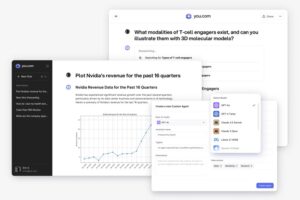
Don’t miss OpenAI, Chevron, Nvidia, Kaiser Permanente, and Capital One leaders only at VentureBeat Transform 2024. Gain essential insights about GenAI and expand your network at this exclusive three day event. Learn More
In the race to adopt AI and gain a competitive edge, enterprises are making substantial investments. They are pouring millions of dollars (sometimes even billions) into high-performance models and using them to build applications capable of driving efficiencies across different internal and external functions. The work is accelerating, but many teams are also beginning to note that their investments are not paying off — with the applications not delivering the expected results and ROI.
The problem at the core is data. Most companies are struggling to put their data affairs in order and unify all the proprietary information they have. Enter CData, a company addressing this ‘integration’ dilemma with a range of data access and connectivity solutions. Today, the startup announced it has bagged $350 million in growth funding from Warburg Pincus and Accel to further accelerate its work, allowing engineers and business users alike to access and integrate data from any source or system.
“Data access is at the core of any AI, ML, or advanced analytics strategy, but continues to be a challenging roadblock to innovation for many organizations today. Given their vast experience working with companies of a similar profile, partnering with Warburg Pincus and Accel will help CData thrive in our next stage of business, bringing cutting-edge solutions to the market and supporting our customers’ modern data initiatives,” Amit Sharma, the co-founder and CEO of the company, said in a statement.
Before this, the company had raised $160 million across a couple of rounds from Updata Partners.
Countdown to VB Transform 2024
Join enterprise leaders in San Francisco from July 9 to 11 for our flagship AI event. Connect with peers, explore the opportunities and challenges of Generative AI, and learn how to integrate AI applications into your industry. Register Now
What does CData have on offer?
Today, the technology stack of enterprises is nothing less than a web of complex systems and applications. From CRMs to SaaS tools, they use all kinds of platforms to keep their business up and running. Some even have over 100 applications. This surge in systems has triggered a massive growth in the volume of enterprise data. However, the thing is, most of this information just exists within the enterprise. Due to the siloed nature of their source tools, it doesn’t connect and get utilized as a whole (at least not without significant engineering efforts). This ultimately affects downstream AI and analytics projects.
Spun out of /n Software in 2014, CData bridges this gap with a connectivity platform that provides purpose-built connectors that address both replication and live data access use cases.
“Customers benefit from being able to utilize a common approach to connectivity that supports both integration patterns – whether they need to physically move their data into a separate system such as a data warehouse, or query live data from another application without any data movement,” Sharma told VentureBeat.
With the replication approach, the connectors sync data from different databases, apps, APIs, data warehouses, enterprise resource management and customer relationship management platforms and services. This stitches together siloed data to feed AI and BI systems. Meanwhile, the live connectivity capability allows direct system-to-system access, giving data teams and other lines of business the ability to consolidate analyze and report on data in real-time.
Over the last ten years, the company has built a library of more than 300 standards-based data connectors, which are being used by the data and IT leaders at more than 7000 global organizations, including Office Depot, Holiday Inn, Tesco Bank and FedEx. Notably, hundreds of data management providers and independent software vendors have also embedded CData connectors into their platforms to support their customers’ data integration needs.
“As OEM customers, product leaders across major names like Google, Salesforce and Informatica turn to CData to address customer requirements for expanded connectivity instead of spending development cycles trying to build and maintain integrations in-house. Embedding CData connectivity solutions provides immediate ROI by accelerating time-to-market, reducing development costs, and providing a stickier customer experience,” Sharma added.
Goal to meet increasing demands for AI
While CData has already established itself as a leader in the data integration space — growing more than 40% year-over-year, the company is well aware that the job is far from done. With the surge in AI workloads at different levels, enterprises today are in more need of sophisticated integration tooling than ever. CData wants to capitalize on that demand.
“We have started to see a significant pull from the market driven by investments in AI. As organizations attempt to meet a new level of demand for data access to feed their models, we are seeing an expanded need for connectivity – particularly across our OEM business. It is now a requirement that all modern software platforms have a significant AI strategy and feature set, which requires a significant amount of data, and the ability to effectively integrate and manage that data for AI initiatives,” Sharma said.
With the growth capital from Warburg Pincus and Accel, which reportedly values CData at $800 million, the company will increase its investments in operations, go-to-market strategy and product development. This, it hopes, will help take existing and new connectors to more enterprises, simplifying how they stitch information together for modern AI initiatives.
“As the AI market continues to evolve, we will ensure we’re providing the absolute best connectivity to the systems and applications our customers utilize for their modern data use cases. In addition, we’re continuously evaluating where we can utilize advancements in AI to strengthen our products and provide more value to our customers,” Sharma noted while suggesting the company will close the year near $100 million in annual recurring revenue.
According to Precedence Research, the global data integration market was valued at $13.6 billion in 2023 and is expected to witness a compounded annual growth rate of 12.32% over the next ten years to hit $43.38 billion by 2033. The increasing volume and variety of data will primarily drive this surge. Other notable players in this space competing with CData are HighTouch, Syncari and Matillion.
Source link




